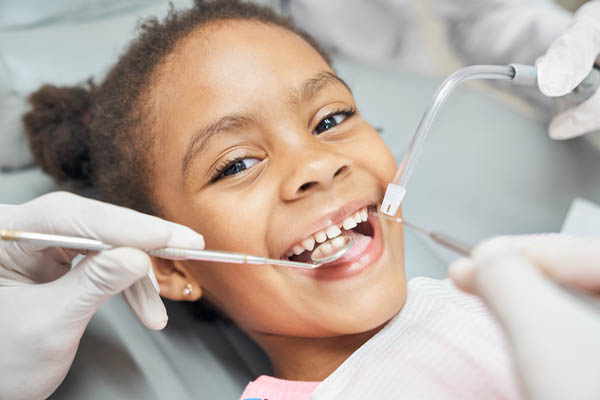Four Tips from a Pediatric Dentist on Cleaning Baby Teeth

Pediatric dentists treat children who still have their baby teeth. Part of ensuring children can prevent oral health concerns at a young age includes teaching patients how to help their children brush and floss daily. This review discusses how parents can care for their child’s baby teeth between visits with their pediatric dentist.
Pediatric dentistry tips: how to clean baby teeth
Four key tips to remember when helping your child clean their baby teeth are to use a child-sized toothbrush, avoid using too much toothpaste, do not allow your child to brush on their own too soon, and ensure a consistent oral care routine is established. These tips, along with regular visits to the pediatric dentist, can significantly reduce the risk of cavities and other oral health concerns.
Use a child-sized toothbrush
Using an adult-sized toothbrush can make brushing your child’s teeth far more challenging. Instead, ask your pediatric dentist if they can provide a child-sized toothbrush to use or find a dentist-recommended child toothbrush. This can ensure that you can help your child brush gently yet thoroughly and reach all areas of the mouth effortlessly. It may also be less intimidating for your child to use an appropriately sized toothbrush.
Do not use too much toothpaste
A common mistake parents make is using too much toothpaste when brushing their child’s teeth at a young age. Up until the age of three, children only need toothpaste the size of a grain of rice, according to the American Dental Association. Children between the ages of three and six only need approximately a pea-sized amount of toothpaste. Most pediatric dentists recommend using fluoride toothpaste to help strengthen the tooth enamel.
Do not allow your child to brush alone too soon
There is no specific age that is typically recommended for children to begin brushing on their own. Instead, it should be based on comfort level. However, it is important not to hand the reins over too soon. While helping your child brush, be sure to educate them on how to do so properly. Once they begin doing it on their own, monitor them and correct any mistakes they make until they get the hang of it and develop healthy habits.
Remain consistent with the brushing routine
Consistency is the key to good oral hygiene. Brushing infrequently can lead to a build-up of tartar on teeth and damage enamel, which can eventually lead to cavities on baby teeth. Be sure to help your child brush several times each day for approximately two minutes during each cleaning routine.
Pediatric dentistry visits are an important part of oral care
While implementing a proper oral care routine for your child is a great way to reduce the risk of developing issues, it does not replace the need for regular check-up visits and cleanings from a pediatric dentist. If your child is due for their next check-up, then call our kid-friendly pediatric dentistry team to set up a visit.
Request an appointment here: https://www.breapediatricdentists.com or call Brea Pediatric Dental Practice and Orthodontics at (714) 782-0215 for an appointment in our Brea office.
Check out what others are saying about our dental services on Yelp: Pediatric Dentist in Brea, CA.
Related Posts
A key goal of pediatric dentistry is establishing healthy oral hygiene habits early to promote long-term oral health. With guidance from a pediatric dentist, parents can help their children understand how to maintain clean and healthy teeth at home. This early exposure can make healthy habits — like brushing twice daily, flossing daily, and eating…
Visiting a kids orthodontist at the right time allows for early detection of potential alignment issues and helps determine if your child will need treatment in the near future. Prioritizing orthodontic treatment enhances the appearance of a child's smile and supports proper dental development and health. However, it is normal for children to feel hesitant…
When it comes to your child's dental health, the first visit to a pediatric dentist is a significant milestone. It sets the foundation for a lifetime of healthy oral hygiene habits and helps alleviate any anxiety your child may have about visiting the dentist. If you're searching for a "pediatric dentist near me," it's important…
It is common for children to face challenges with their oral health, and one of the professionals who can help is a kids orthodontist. While an orthodontist does not focus on cleaning the teeth and filling cavities, they do work on a holistic level to set up the child for oral health success both now…
